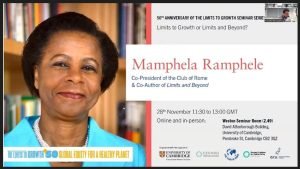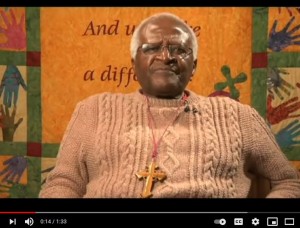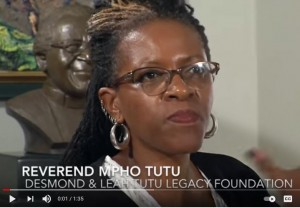UBUNTU
Ubuntu
pronounced: oo – boon’ – too
Is it an operating system? YES!
It is a new operating system for computers (see below); but humans have been using this operating system for thousands of years.
UBUNTU is a sub-Saharan philosophy that recognizes the interdependence of life.
Desmond Tutu tells us: “There is no such thing as a solitary individual. A person is a person through other persons.”
Nelson Mandela said: “Ubuntu acknowledges both the right and the responsibilities of every citizen in promoting individual and societal well-being.”
Here are a few videos from Archbishop Desmond Tutu to orient our understanding:
A Brief Description * Intro from Semester at Sea * The Essence of Being Human
<-And from his daughter, the Reverend Mpho Tutu
Reverend Tutu said: “Africans have a thing called ubuntu. We believe that my humanity is caught up, bound up, inextricably, with yours. When I dehumanize you, I dehumanize myself. The solitary human being is a contradiction in terms. Therefore, you seek to work for the common good because your humanity comes into its own in community, in belonging.”
Mamphela Ramphele
UBUNTU: A Self-Liberating Shared Value System. 11.28.22
https://www.youtube.com/watch?v=w0s-MA_gm4I
“Humanity must shift its mindset from me, myself and I to recognition that to be human is to be relational and inextricably interconnected and interdependent within the web of life. The failure to address relational factors robs us of the opportunities to promote conversations that are essential to developing empathy and shared goals that are fundamental to the governance of the Commons. Emergence from the multiple emergencies upon us requires nothing less than learning anew how to be human.”
UBUNTU OPERATING SYSTEM
![]() For ubuntu™, the computer operating system (an alternative to Microsoft and Macintosh) click on the logo or the link: www.ubuntu.com/about. From the website: We bring the spirit of Ubuntu to the world of computers and software by delivering free software, freely, to everybody on the same terms. Whether you are a student in India or a global bank, you can download and use Ubuntu free of charge.
For ubuntu™, the computer operating system (an alternative to Microsoft and Macintosh) click on the logo or the link: www.ubuntu.com/about. From the website: We bring the spirit of Ubuntu to the world of computers and software by delivering free software, freely, to everybody on the same terms. Whether you are a student in India or a global bank, you can download and use Ubuntu free of charge.
Fair Shake’s operating system is based on the philosophy of ubuntu.
What Is Ubuntu?
https://www.ttbook.org/interview/i-am-because-we-are-african-philosophy-ubuntu
Definition as found in the Internet Encyclopedia of Philosophy.
“Ubuntu” is what it means to be human, based on the Nguni/Ndebele phrase: umuntu ngumuntu ngabantu (a person is a person through other persons).
“Ubuntu” is a concept in which your sense of self is shaped by your relationships with other people. It’s a way of living that begins with the premise that “I am” only because “we are.” The Kenyan literary scholar James Ogude believes ubuntu might serve as a counterweight to the rampant individualism that’s so pervasive in the contemporary world.
“Ubuntu is rooted in what I call a relational form of personhood, basically meaning that you are because of the others,” said Ogude. “In other words, as a human being, you—your humanity, your personhood—you are fostered in relation to other people.”
An Ubuntu Fable:
A visiting anthropologist had been living in a village for quite some time. The day before he was to return home, he played games with the children. Near the end of the day, he put together a gift basket filled with delicious fruits from around the region and wrapped it in a ribbon. He placed the basket under a tree and then gathered up the children.
The anthropologist drew a line in the dirt, looked at the children, and said, “Let’s race! When I say “go”, let’s run to the tree and whoever gets there first will win the basket of the fruit.”
When he said “Go!” the children grabbed each other’s hands and ran together to the tree. Then they sat together around the basket and enjoyed their treat as a group.
The anthropologist was shocked. He asked why they would all go together when one of them could have won all the fruits for themselves?
A young girl looked up at him and said, “How can one of us be happy if the others are sad?”




